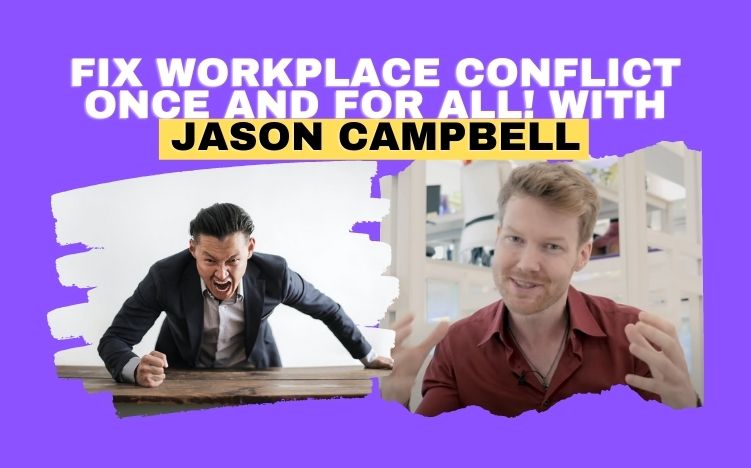Hey, everybody, it’s your inspirational, internet marketing, and financial literacy lover Adventago, and today I’m going to be talking about Jason Campbell from Mindvalley, and how to deal with difficult co-workers at the workplace.
Now, what I want to talk about is something interesting. A lot of us might be in the workplace, and the people we work with are not ideal.
There are always little conflicts that can happen, maybe you find yourself around a water cooler and there’s that one person you’re like, “Oh my gosh, they’re always late to meetings,” or that one person who always says they’re going to do something but they never submit the work.
But, I’ll talk about one that’s even more sensitive than that, and that is, when you have a boss, or a supervisor, that seems to treat you badly, and they seem to be quite abusive.
Well, is there a solution to this? Or are you just doomed in your workplace to be with these people?
What Jason Campbell from Mindvalley is hoping to share are some different strategies that you can do to deal with this once and for all.
But before he goes into defining what you can do with difficult co-workers, there are many different types.

Working with other human beings is one of the most difficult things to do, if you look at the divorce rate in marriages, it’s over 50%, and those are supposed to be people that are in love for the rest of their lives.
You go into the workplace with people you didn’t choose to work with, and in different environments where you’re all having different expectations, different stories, and different backgrounds.
Can conflict arise? You bet it does, and so, what Jason Campbell from Mindvalley wants to do here is shift your perspective, because there might be a difficult pill to swallow, but he really wants to share this with you, and that is, if you’re having issues with a co-worker, and you’re having conflicts…
It’s your fault.
Yeah… Jason Campbell from Mindvalley admits it’s your fault. He doesn’t like realizing it, but when you do, there are a couple of things that are going to happen.
You see, if you continuously blame other people for the problems you have in the workplace, you become a victim.
And if you’ve studied any kind of personal growth, there’s an author called Michael Beckwith, who talks about the different stages of your growth.

And the lowest one you can be at is the victim state, which means you are powerless, over your environment.
And if it’s in the workplace, then you find yourself not being able to change the circumstances that you’re in.
That’s why the most effective thing you can do first is to claim responsibility, if you know it’s your fault, then you step into a space where you have power, and you can make a change.
I know your situation might be complicated, but here’s one thing you can do, regardless of your difficult co-worker situation.
It’s usually when there are disagreements, it has to do with communication, Jason Campbell from Mindvalley, was having a conversation with Lisa Nichols.
She’s a motivational speaker, she speaks around the world about all aspects of personal life and professional life, she gets invited to speak to Fortune 500 companies and help them communicate better, and build better teams.
And here’s what she talks about: Crucial conversation, and critical courageous conversations, are the key to being able to build really strong workplace environments.

Because if you are being a victim, and you’re having these difficult co-worker situations…
Are you addressing that issue?
Are you having strong communication, and strong conversations with these people to solve it at the root?
Here’s a quote that shocked Jason Campbell when he was talking to Lisa Nichols from Mindvalley, she said…
“If you’re speaking about any difficulty you have in the workplace with someone that can’t influence the outcome, that’s gossip, and if you are gossiping within the workplace about the frustrations you have with people who are not going to influence the outcome, you are wasting your energy, time, nurturing your victim state, and trying to find empathy for your situation with people that can relate, It’s often what you would call triangulation.”
Jason Campbell says he remembers having this conversation with Teal Swan, she’s a personal growth personality on YouTube.
And when Jason Campbell interviewed her, it was crazy because everything she was talking about workplace conflict always came back to childhood traumas, the kind of traumas you had in your childhood will be re-lived within the workplace.

Isn’t that strange? If you were finding that you were never getting attention, or you were never getting your ideas listened to,
You might go back into your childhood and realize… “Wow, Mom and Dad never listened,” Or “With my friends, it seems like I was always the last one to have the right ideas.”
These types of past experiences might replicate themselves in the workplace, Jason Campbell admits, he would often under-communicate, and when he would get frustrated, he would stay in that frustration and not communicate with that person.
But do you know what would happen when Jason Campbell did have that conversation with the other person? The rage would immediately dissipate because he would pull them aside.
DISCLAIMER THS IS A CRITICAL STEP: If you are going to be addressing a conflict with somebody in the workplace, you must do it privately. If you do it in public, it’s kind of like shaming them, and everybody reacts to shame in a bad way, also, it will trigger all of their baggage and their trauma too.
If you have read The Seven Habits of the Most Highly Effective People, By Stephen Richards Covey, he talks about one of the habits is…
If you want to be understood, first seek to understand.

But before you do that, when you pull that person aside, go with the intention of understanding them, because they have their own issues that they have to deal with, and there might be a very simple explanation as to why they are treating you this way.
Perhaps, they are unaware of their behavior, perhaps, they have never received feedback on how their behavior is affecting you, and other people in the workplace.
When you have these conversations, make sure you’re not doing any kind of attack, come from your perspective, feelings, and communicate with respect.
For example, Jason Campbell remembers speaking with his boss, pulling him aside, and saying to him…
“Hey, I just wanted to share some feedback, because I know in the previous meeting, I felt that you were a little aggressive, I felt that you didn’t actually listen to the ideas that were being shared, and I even felt that I couldn’t even have a chance to speak because, I am the type of personality that will shut down if there’s a situation of conflict, so, I wanted to know was there anything up… Are you okay?”
When he goes in with the intention of empathy, that person said, “Wow, I didn’t realize that I came across so aggressively.” And Jason said, “You probably would want to communicate with the other team members, but I’m happy that I got that off my chest.”
Just getting that off his chest was something that relieved most of the pressure that Jason Campbell was feeling from having a difficult co-worker, and from there, they weren’t perfect but, they started having a bit more awareness.

Here is something important to remember, Jason Campbell was reading a book called Crucial Conversations, and in there, it talks about those situations where stakes are high, emotions are high, and you’re at opposing views with somebody else.
Now, 90% of the communications you have in the workplace are not going to be crucial, they are going to be everyday types of conversations.
But there’s something interesting that happens in that 10% when it turns crucial, which is when everybody’s emotions go high, you don’t start acting logically anymore.
You start acting very emotionally, and people typically have two types of responses, either they become aggressive, or they become passive.
And so, when you notice that in the other person, you know that something is happening to them emotionally, whether they’re aggressive or silent.
If they are aggressive, you definitely want to apply this technique, which is to pull them aside and have that conversation to understand what’s going on.
They did not feel psychologically safe in whatever conversation or environment they were in, this is when you are going to want to pull them back and see how you can restore that safety first.

If you see that they are silent, make sure you invite them to engage more, because if they are silent, you are not getting any useful feedback, plus, further conflicts could arise from resentment and uncommunicated issues.
The most important thing here is to…
Make sure that you are not going to gossip, if there is going to be some conflict in the workplace.
Have courageous, conversations, and crucial conversations.
Make sure that there’s psychological safety.
Be a part of nurturing, by having the courage to have honest conversations with the colleagues you might disagree with.
It will show that you are someone who is stepping above and beyond, and trying to resolve the conflict.
Unfortunately, if nothing else works, then perhaps you need to look for a completely different environment.
But don’t give up on the environment first, because you need to take responsibility and do the right changes.

Because, once you go through that, you will have a transformation within yourself, and whatever issues that might be making you feel like people are not being fair to you…
You might end up realizing that they were in your head, so make sure you have more of those conversations before you do anything else.
I hope these tips helped deal with conflict in the workplace.
Jason Campbell from Mindvalley gets a chance to interview experts in this field every single week, and now wants to share all that knowledge he has absorbed with you!
So make sure to follow him too, you can learn more about him and his life-changing work…
Thank you for reading this blog post, I appreciate you taking the time out of your day to fill your brain with something that will inspire you to be more in your life, and give you the boost you need to keep pushing toward your hopes and dreams.
If you liked this blog post, and want to see more like this then, do me a tiny favor and follow me on whichever platform is best for you.
↓ ↓ ↓
Join our notification squad on Aweber
And
For PC click the GREEN bar at the bottom, and for MOBILE click the BLUE button at the bottom of your screen to get immediate notifications from your browser.
“mindvalley”,”personal growth”,”vishen lakhiani”,”personal development”,”extraordinary life”,”dealing with difficult people at work”,”how to get along with coworkers”,”workplace conflict”,”conflict resolution in the workplace”,”difficult coworkers”,”dealing with difficult coworkers”,”coworkers are not your friends”,”types of coworkers”,”types of employees”,”how to deal with difficult people”,”how to deal with toxic people”,”co-workers”,”co workers”,”dealing with difficult people”

